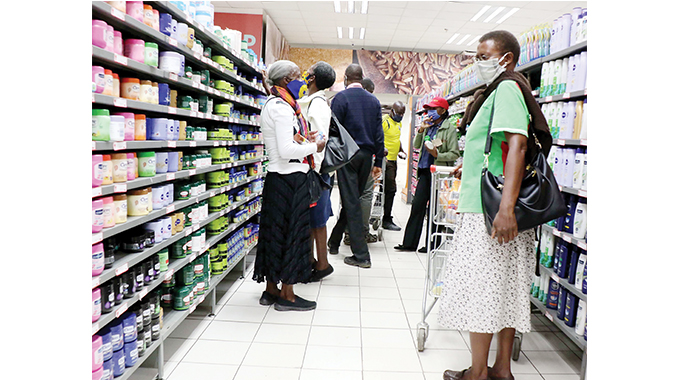Govt to unveil price stabilisation measures

Nqobile Tshili/Andile Tshuma, Chronicle Reporters
GOVERNMENT will soon announce measures to stabilise prices of basic commodities while arresting inflation as consumers’ buying power continues to drop.
While prices of basic commodities are constantly increasing, salaries remain stagnant.
Basic commodities although priced in local currency are largely pegged against the black market US dollar cross rate.
The exchange rate at the parallel market was US$1:$60 via electronic transfers and US$1:$45 for cash transactions. The official rate is 1:25. The price hikes are against last month’s Government and industry moratorium that prices should revert to March 25 levels.
Information, Publicity and Broadcasting Services Minister Monica Mutsvangwa, in a post-Cabinet briefing yesterday said Government will soon announce measures to arrest speculative behaviour in the market.
She said Cabinet received an economic report from the Minister of Finance and Economic Development Professor Mthuli Ncube and Reserve Bank of Zimbabwe Governor Dr John Mangudya, observing that price hikes did not follow economic fundamentals. “It is also stressed that the current price and foreign exchange rates fluctuations, are clearly divorced from real economic fundamentals. This can be attributed to speculative tendencies. The Minister of Finance and Economic Development and the Governor of the Reserve Bank will announce measures which will see the situation stabilising in due course,” said Minister Mutsvangwa.
Prof Ncube said Government will continue engaging the retail sector on implementation of the price moratorium, with the hope that the sector does not react to fluctuations on the parallel currency market. “We will surely urge; we will surely reach out to industry or maybe this time to firm up so that we could control these prices. So that they do not immediately react because that is what has been happening that they have been a reaction to the parallel rate when the parallel rate moves the retail sector prices also move,” said Minister Ncube.
A Chronicle news crew observed that prices of basic commodities such as 2 litre bottle of cooking oil went up from $140 to $165, a 2kg packet of sugar which was last week going for $67 sold for $139, although it was not available at most shops. A 2kg packet of flour which was selling for at most $88 was going for between $99 and $125 depending on the manufacturer and brand. Rice which was being sold for up to $95 is now selling for $122 while bread sold for $30 last week is now selling for $38.
The news crew observed that a two-litre bottle of Mazoe orange crush was being sold for between $116 and $130 in major retail outlets and anything up to $180 in smaller shops.
Last month’s poverty datum line (PDL) for an average family of five was $6 420,87, reflecting a 21,3 percent rise from February’s $5 292,63 Zimbabwe National Statistics Agency (Zimstat) reported.
Therefore, the recent price hikes mean that the PDL has further slumped while salaries have remained stagnant.
The lowest paid civil servant earns at least $2 500.
A standard lunch in the central business district in Bulawayo at the moment, which comprises isitshwala, a piece of meat and vegetables now cost $110, which means a person working for 20 days will have to spend $2 200 if they are buying lunch every day. Consumers who spoke to Chronicle yesterday said Government should intervene as most of them cannot afford basics.
Some of them blamed businesses for unjust price hikes saying manufacturers and retailers were taking advantage of the locked borders, which prevent them from buying products from neighbouring countries.
Ms Anna Ncube said life has become increasingly hard as prices of basic commodities are constantly going up.
While prices are going up our salaries remain unchanged. We can hardly afford to buy anything now. Prices drastically increased, starting from midweek last week. Although I can’t give the actual percentage increase, I know products such as sugar are now selling at between $120 to $130. The local currency is losing its value and I think Government should consider dollarising the economy. That way life will be much better,” said Ms Ncube.
Another consumer, Mr Musawenkosi Ndlovu from Magwegwe suburb concurred with Ms Ncube on dollarising the economy. “This situation is not getting any better. Prices are going up almost every day. I just bought a handful of groceries but if you check the prices you will be shocked. These prices are bringing untold suffering to a lot of families,” said Mr Ndlovu. “We should just dollarise as prices are fairly manageable for those buying in foreign currency. I also think our local manufacturers and suppliers are also taking advantage of borders that are closed due to national lockdowns particularly in South Africa. If the border was opened, we would have crossed it to buy commodities as opposed to this madness we are experiencing locally.”
He said prices for some commodities were not just too high but goods were no longer found in the main retail shops, although they were sold on the parallel market in foreign currency.
Another consumer Mr Bongani Ndlovu from Pelandaba suburb said Government should subsidise basics to arrest skyrocketing prices.
Confederation of Zimbabwe Retailers Association (CZRA) which had assured Zimbabweans that prices would drop last month, yesterday said it was difficult to reduce prices due to instability of the currency market.
CZRA president Mr Denford Mutashu said: “Under the current environment it is a delicate situation as cost drivers are not letting up. The hyper inflationary pressure is standing in between a noble intention and implementation. The foreign currency situation has not favoured doing business. If at all the major focus currently is to stabilise supply before moving to price stabilisation. Supply of sugar, subsidized mealie meal etcetera demands more attention.”
He said ongoing consultations on the pricing regime were yet to yield results but said businesses remained positive that the situation would change.
Government through the Ministry of Industry and Commerce last month held a multi-sectoral meeting with various key stakeholders which included Grain Millers Association of Zimbabwe, Consumer Council of Zimbabwe, CZR, National Bakers Association of Zimbabwe, Oil Expressors, Association of Zimbabwe, National Foods and Zimbabwe Sugar Sales, among others and agreed to a price moratorium and that shops should revert to March 25 prices. — @nqotshili/-andile_tshuma









Comments